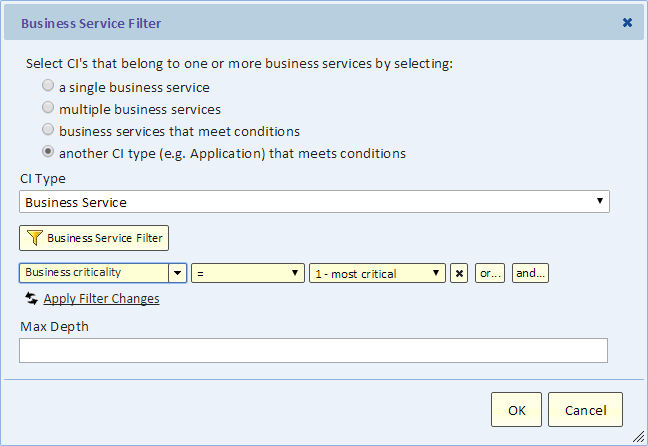Business Service Filter
Contents
Introduction
As with all data filters, a business service filter allows you to restrict the data for the view to only those rows of data that meet the filter condition.
A business service filter is applies to a configuration item. Therefore, it only applies to fields that are a reference to a configuration item table, or to the Sys ID field of a configuration item table. In this context, a configuration item table is the ServiceNow Configuration Item table (cmdb_ci) or any table that extend from it, including custom tables that extend the Configuration Item table.
There are several kinds of business service filters as you can see in the drop-down of the following image depicting a business service filter.
is downstream from
This filter matches configuration items that are downstream from the specified upstream item. Autocomplete helps specify the upstream item which can be any CI including a business service, an application, or any other type of CI. By downstream from the upstream item we mean that the upstream item has a relationship in which it’s the parent or an ancestor (parent’s parent up to 10 levels above).
This filter can locate all the items that belong to an upstream item such as a data center or an application.
is upstream from
This filter matches configuration items that are upstream from the specified downstream item. This filter can, for example, locate all the items that depend on or are impacted by the specified downstream item.
belongs to service
Similar to "is downstream from", this filter matches items that are downstream from the specified business service. The Autocomplete here only shows business services. This filter can locate all the items that belong to a business service (up to 10 levels deep).
belongs to services
This filter matches configuration items that are downstream from any of the specified business services. A picker lets you select multiple business services. This filter can locate all the items that belong to any of the specified business services.
belongs to any business service
This filter matches configuration items that belong to a business service -- any business service. This is useful for optimizing performance when using a business service field and we want to skip CI's that do not belong to any business service. By eliminating such CI's from the query, we can calculate the business service for the remaining CI's faster.
belongs to / not belong to
This filter matches configuration items that belong to selected business services. To specify the selected business services, the business service filter dialog provides many advanced options.
a single business service
This is similar to the "belongs to service" filter with the option to specify a Max Depth. By default when we search downstream from a business service we consider chains of relationships up to 10 levels deep. Using this dialog you can specify a smaller or bigger number of levels to consider. Limiting the number of levels can make your search more selective and also improve its performance.
multiple business services
This is similar to the "belongs to services" filter with the option to specify a Max Depth. Reducing Max Depth can make your search more selective and also improve its performance.
business services that meet conditions
This option provides a powerful filter to help you locate exactly the services that you want to include. In the picture you see an example of selecting most-critical services. Similarly, you can use the filter to select services by name, by class, by owner, by manager and more.
another CI type that meets conditions
For even greater flexibility, this options relaxes the assumption that we’re specifying business services and instead we could look at application environments, for example, and look for CIs that belong to those application environments. When using this feature, the filter becomes based on the type of CI that you select and will only show you fields from that type of CI.

